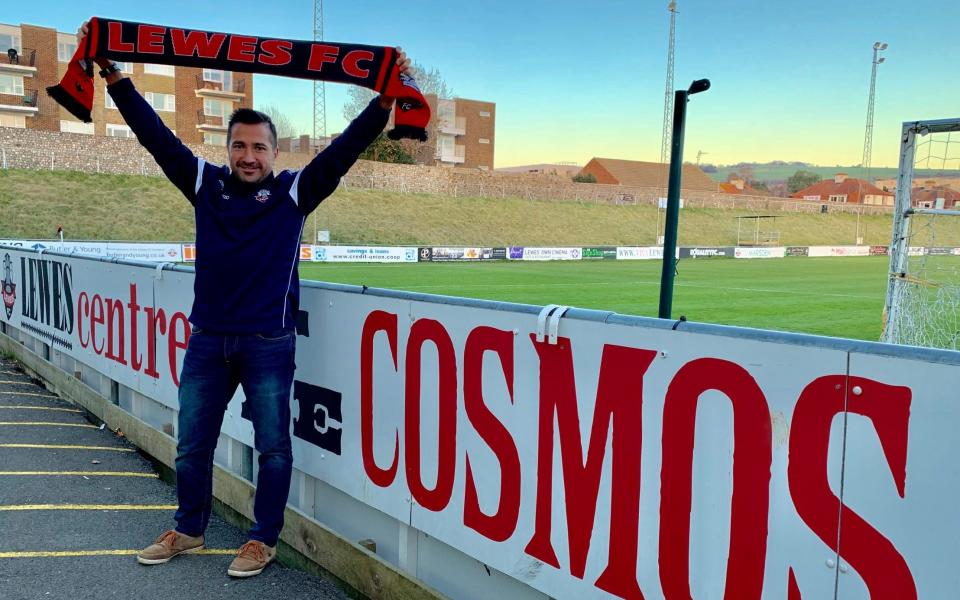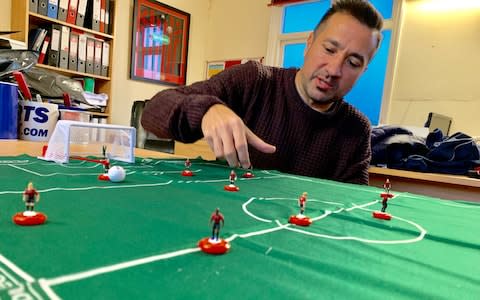Lewes FC's equality policy earns women's team captive US audience for League Cup tie with Crystal Palace


Anyone who happens to be in New York City on Sunday need have no fear of missing out. Because Lewes FC’s FA Women’s League Cup tie against Crystal Palace will be screened live in the Smithfield Hall on West 25th Street. That a game between two second tier women's teams in England is being shown in America at all is, according to the Lewes Women's Manager Maggie Murphy, down to one thing: her club’s much-vaunted equality policy.
“A lot of people have become aware of us through our values and decided to support us,” she says of the equal pay and access initiative introduced at the start of the 2017 season, by which the club’s part-time men and women players are paid the same: between £100 and £250 a match. “As a result, a lot of people have become owners, as we call our shareholders. We now have owners in twenty-six countries round the world. I’m not going to describe it as a marketing campaign, because it is much more fundamental than that. But it has meant increased visibility and reach.”
Not least in the identity of the man who will be in the Lewes dug out on Sunday, the first team coach Fran Alonso. Recruited to the staff at Southampton by Mauricio Pochettino, Alonso then worked under Ronald Koeman at St Mary’s, before following the Dutchman to Goodison where he was first team coach.
“My first year with Everton, Lewes started the equality campaign, and I began to follow them,” he explains. “My sister played football in Spain, I used to go and watch her. I always have to hear not nice comments about the women's game, so I was really interested in a club that was paying the same to women as men.” By coincidence, when he was sacked by Everton following Marco Silva’s appointment in 2018, the Lewes job had just become available. And while it might seem a sizeable downwards step from the Premier League to the second division of women’s football, Alonso has not regretted taking it.
“Yes it is a big jump. But from the moment I arrive I fell in love with the club. I have no doubt that I want to be part of it and of the revolution it is trying to deliver in terms of equality.”

The contrast with Sunday’s visitors to East Sussex is significant. Despite their affiliation to a Premier League operation, Palace’s women’s team have faced all sorts of issues in the last couple of seasons. Never mind being paid on a parity with the men, their women players are obliged to pay a subscription to play. One player threatened to sue when she was not granted any access to the club’s medical facilities following a serious injury. And last season, the team was only kept afloat after a generous donation from the men’s star player, Wilfried Zaha.
“It’s naturally a challenge to play the teams associated with big clubs,” says Murphy. “Yet when we speak to them they are often jealous of our freedom. Sure, we don’t have the name or the history or the money. But we get to choose our path.”
Lewes’s women also, thanks to the rigours of the equality programme, get to play in the same stadium as the men. At the magnificently monikered Dripping Pan, men's and women's games attract roughly the same crowd – around 750. And while bar takings are higher at men’s games, more pies are sold when the women play.
“That’s another reason why some of the bigger clubs are jealous of us,” says Murphy. “Because we get to play in our own ground [rather than having to borrow a non-league facility as Palace do at Bromley], we get to keep the revenue from pies.”

Not that everyone is equally enthused by Lewes’s equality policy. This week a board member named Barry Lewis resigned, claiming that the politics was overtaking the sport.
“My view was that we were running a football club, not a think tank,” he says. “I’m probably the first football director in history to stand down to spend more time with the football.” And indeed, there could be issues ahead. If Lewes – as yet unbeaten this season – are promoted to the Women's Super League they will be obliged to go full-time. The required increase in budget would of necessity dwarf that needed to pay for the part-time men’s team. Lewes’s future might be of men’s football becoming an appendage to the women's game.
“The ambition is to be in WSL and we have plans about how we would approach it,” says Murphy. “We’re learning as we go. Everyone in women's football is trying to carve their own way. There is no cookie cutter recipe to success. But whatever happens, we will stick to our values.”

 Yahoo Sport
Yahoo Sport 





































